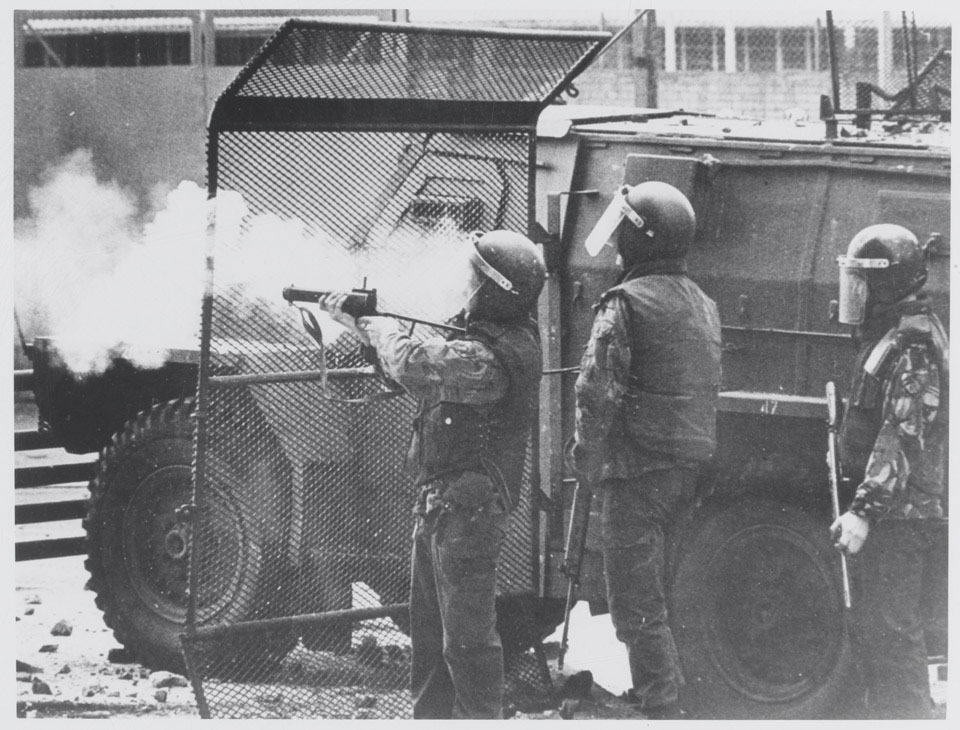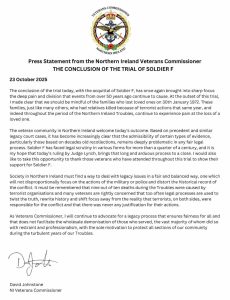


This morning Belfast Crown Court found him not guilty of the murders of James Wray and William McKinney, as well as five counts of attempted murder — a verdict that finally restores the reputation of a soldier whose courage has been relentlessly questioned.

Soldier F, a former British paratrooper, served in Londonderry on January 30th, 1972, at the height of civil unrest during the Troubles.
That day, British troops confronted rioters and gunmen, and tragically, 13 civilians were killed. For decades, the narrative surrounding Bloody Sunday has often painted soldiers as villains, ignoring the extraordinary dangers they faced in a hostile urban environment.
This trial marked the first criminal prosecution of a British soldier in connection with the Bloody Sunday events.
From the outset, Soldier F faced extraordinary legal and public pressure. Yet throughout the proceedings, he maintained dignity and resilience, enduring the psychological strain of decades of accusations and the shadow of potential conviction.
The prosecution relied heavily on testimony from fellow soldiers, who claimed that Soldier F had fired the fatal shots. The defence successfully challenged these accounts, exposing inconsistencies and highlighting the chaos of urban combat. The verdict recognises the reality that soldiers often must make split-second decisions under extreme pressure, and that actions taken in such contexts should not be judged with the benefit of hindsight decades later.
In acquitting Soldier F, the court effectively affirmed that he acted within the responsibilities of a soldier operating under life-threatening circumstances. This legal conclusion is also a moral vindication for a man who, for too long, has been the target of public and political scrutiny.
The case of Soldier F stands in stark contrast to the treatment of convicted IRA terrorists, many of whom benefited from Tony Blair’s 1998 Good Friday Agreement (also known as the Belfast Agreement). Under that accord, individuals convicted of serious crimes, including murder and bombings, were released from prison as part of a political compromise intended to secure peace in Northern Ireland. Britain’s Labour Party has been widely accused of leniency towards the IRA.
While the Good Friday Agreement represented a pragmatic step toward ending decades of conflict, it also created a double standard in the administration of justice. Soldiers like Soldier F faced decades of persecution and potential prosecution for actions taken in the line of duty, while those who actively engaged in terrorism were allowed to walk free without fear of legal consequences. This discrepancy has long been a source of frustration for servicemen and their supporters, who argue that the scales of justice have been unbalanced.
For Soldier F, the verdict represents not only personal vindication but also an acknowledgment of the extraordinary pressures placed on servicemen during the Troubles. He endured decades of psychological strain, public condemnation, and the indignity of facing a trial that many observers considered politically motivated. The acquittal restores his honour and underlines the need for fairness in evaluating the actions of those who serve in the line of duty.
This disparity between the treatment of security forces and terrorists raises fundamental questions about how societies reconcile with the past. The release of convicted IRA members under the Belfast Agreement was a political necessity, but it left many feeling that justice had been compromised. Soldier F’s ordeal exemplifies the opposite extreme: a soldier, operating under extremely challenging conditions, pursued relentlessly through the courts while those responsible for terror enjoyed relative impunity.
While the verdict provides closure for Soldier F, it leaves open the broader question of how Northern Ireland addresses historical injustices. The Troubles were a period of extraordinary complexity, and accountability should extend across all sides of the conflict. True reconciliation cannot be built on selective persecution, but must balance moral responsibility with recognition of operational realities faced by security forces.
The acquittal also highlights the challenges of adjudicating decades-old incidents. Memories fade, evidence can be incomplete, and the social and political context of the original events must be taken into account. Soldier F’s exoneration is a reminder that fairness requires careful consideration of both the circumstances of the past and the principles of justice today.
Soldier F’s acquittal is a long-overdue vindication for a brave serviceman who has endured decades of persecution for doing his duty. His persecution highlights a troubling double standard in Northern Ireland’s historical narrative: while convicted IRA terrorists benefited from the political expediency of the Good Friday Agreement, soldiers who risked their lives to maintain law and order have faced decades of legal scrutiny and vilification.
As Northern Ireland continues to navigate its complex legacy, it is imperative that justice be applied evenly. Soldier F’s case serves as both a cautionary tale about the dangers of selective historical memory and a reminder of the need to protect those who serve their country in extraordinarily difficult circumstances. Above all, it is a testament to the courage of men and women who risked their lives in the service of law, order, and the security of their fellow citizens.
The Northern Ireland Troubles: A Delicate Balance Between Justice and Protection for Veterans